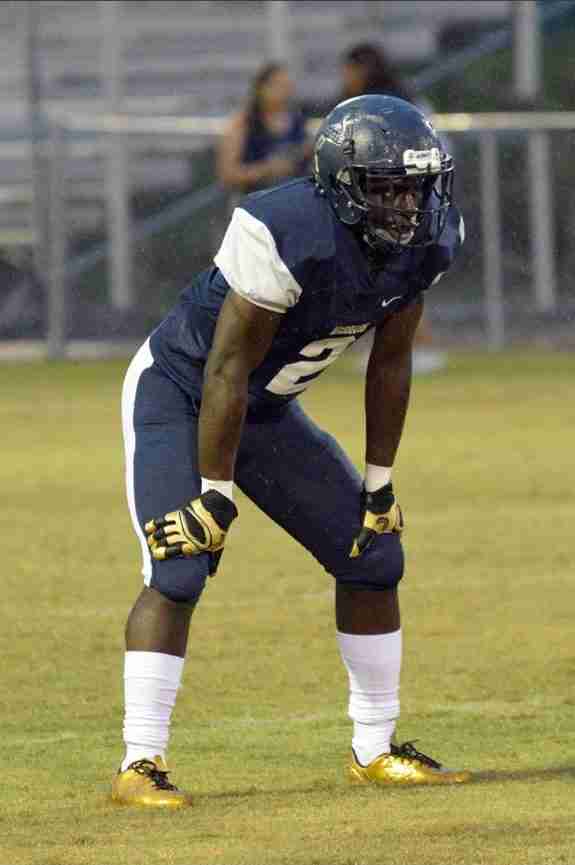Mike Williams was in a car with three other Plant High teammates. They were celebrating their third straight win over Jesuit in boys basketball.
Moments later, the four were surrounded by nearly 20 police cruisers. Officers had guns pointed in their direction. Williams, along with two other African-American teammates, were each handcuffed and escorted to the back seat of a police car. Their other teammate, who is white, stood outside explaining the situation to the police.
“Someone called and said there were guns in the car, which was completely untrue” said Williams, who went to star at Southern California in football and became a first round pick of the Detroit Lions. “We still joke with our white teammate that he had the complexion for protection. He was able to explain away the situation and we were released. We were never more happy than to be able to drive off and go home.”
That situation 20 years ago shaped Williams’ philosophy on coaching — and life. The first-year Wharton coach constantly preaches to his 8-year-old son and his players about surviving the moment, particularly when it comes to dealing with the police.
“I’m trying to keep them here in one piece,” Williams said. “If you’re black and you’re confronted by a police officer, that’s not the time to voice your opinion about being disrespected. Get through it and then we’ll work on getting your just due after that.”
As tensions continued to rise and riots kept escalating near University Mall in Tampa, not far from where many of the Wildcats live, Williams spent hours on the phone this past weekend instructing his players to stay out of harm’s way. For them, rule No. 1 was always in effect: protect the team.
“I knew for many of them it was an emotional situation,” Williams said. “I just wanted to make sure they were not jeopardizing their future.”
Williams was raised by his grandmother, who was a nanny for several white families in Tampa. The two-sport star attended Plant, a predominantly white school.
“I have a somewhat unique experience growing up with all walks of people,” Williams said. “At Plant, I would have some white students who would say things to me, but then I would have other white students who would be the first to condemn them.
“Right now, we’re at a fever pitch with the climate of our country. But this is not a black vs. white thing. It’s a black vs. racist thing. If you’re white, and you’re not a racist, then there really is no problem.”
Williams’ coaching career is just as diverse as his upbringing. He started off guiding middle schoolers in Brentwood, a swanky Los Angeles suburb, then took on jobs in Compton and Watts.
Last year, Williams returned to Tampa after reading about the death of Middleton incoming freshman Hezekiah B. Walters, who collapsed after a summer conditioning workout in June of 2019. Williams took over the Tigers program before moving on to Wharton this offseason.
Those stops on different coasts helped Williams understand just how important football is in bridging the gap between black communities and police force.
For years, Williams has served on the board of a little league in Watts that is now sponsored by the Los Angeles Rams. Police officers serve as coaches and role models for players, some of whom start at 6 years old. Williams wants to eventually start his own mentoring program in the area.

It is not just Williams. Other coaches are looking for ways to create a positive change. John I. Leonard’s Keith Chattin, who previously coached at Lennard, is putting together a Zoom meeting with 50 high school coaches from across the country in hopes of creating more dialogue and better understanding of societal issues.
Players are doing their part, too. Former Sickles and Clemson standout Ray-Ray McCloud, now with the Buffalo Bills, organized a cleanup crew for the area near University Mall that included his younger brother Jordan (Plant/USF), as well as Auden Tate (Wharton/FSU/Bengals) and Isaiah Rodgers (Blake/UMass/Colts).
Other players wanted their frustrations to be heard. Former Armwood running back Larry Anderson took part in the protest in downtown Tampa this past weekend. He also attended a protest in 2012 for Trayvon Martin.
A few years ago, Anderson and his brother were pulled over and surrounded by cops on their way to buy a car. They were never arrested. Anderson said he encountered more racism with students than with authorities.
Former Zephyrhills Christian standout Javion Hanner planned to attend the protest in Tampa but his mother said it would be too dangerous.
Last month, Hanner and his cousin were leaving a Clearwater Beach parking garage. As they were loading the car, two police officers drew their guns and told them to sit down. The two provided identification and were eventually released.
“(The officer) said we didn’t have any warrants so he was gonna let us go,” said Hanner, who played at Urbana this past season before the school closed down. “What made it bad for us is that there were other people getting in their cars, too. The officers walked past them and came to us. It was just embarrassing sitting with the cops by your car while people walked by and you didn’t do anything but try and leave.”

Still, despite that incident, Hanner said there is hope for the future.
“I think if we all just admit there is a problem and stand against it together then all the riots wouldn’t happen,” Hanner said. “People feel unheard. We tried to be peaceful. We’ve everything. What will it take?
“Honestly, though, I’m proud because it’s more people uniting than ever before, no matter what color. It’s a blessing to see.”